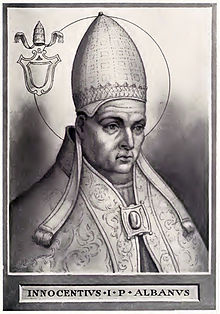
Born at Albano, near Rome, Italy; died in Rome, March 12, 417. Innocent, pontiff at the time of the capture and sacking of Rome by the Goths under Alaric, succeeded Pope Saint Anastasius I, on December 22, 401. During Innocent's pontificate, he emphasized papal supremacy, commending the bishops of Africa for referring the decrees of their councils at Carthage and Milevis in 416 that condemned Pelagianism, to the pope for confirmation. It was his confirmation of these decrees that caused Augustine to make a remark that was to echo through the centuries: "Roma locuta, causa finita est" (Rome has spoken, the matter is ended). Earlier Innocent had stressed to Bishop Saint Victrius and the Spanish bishops that matters of great importance were to be referred to Rome for settlement. Innocent strongly favored clerical celibacy and fought the unjust removal of Saint John Chrysostom. He vainly sought help from Emperor Honorius at Ravenna when the Goths under Alaric captured and sacked Rome in 41. He was buried in a basilica above the catacomb of Pontianus, and was venerated as a saint. He was a very energetic and active man, and a highly gifted ruler, who fulfilled admirably the duties of his office.




